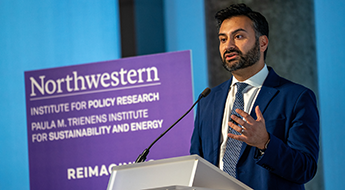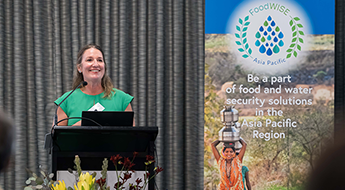COVID-19 Impact Statements Led to More Favorable Tenure Evaluations
Lauren Rivera and Kate Weisshaar discuss their research on efforts to reduce bias in the tenure process and what it means for universities
Get all our news
Narrative interventions, like COVID-19 impact statements, that help gatekeepers contextualize performance in light of opportunities may help evaluators make more equitable promotion decisions.”
Lauren Rivera & Kate Weisshaar
IPR faculty

After the pandemic shut down schools and daycares, some academic institutions looked for ways to make the tenure process more equitable for faculty juggling work and caregiving responsibilities. COVID-19 impact statements, or a statement documenting pandemic-related research interruptions that faculty could include in their tenure submission, were meant to level the playing field for parents—especially mothers.
A new study by IPR associate Lauren Rivera, IPR sociologist Kate Weisshaar, and András Tilcsik of the University of Toronto shows that COVID-19 impact statements were effective tools that helped account for pandemic-related disruptions in tenure decisions. They examined the tenure process for 602 faculty members in STEM fields from 35 of the 100 top-ranking U.S. research universities. Their findings suggest that the way we talk about work disruptions matters when it comes to caregiving and gender bias in job evaluations.
In a joint Q&A with IPR, Rivera and Weisshaar share their research and the lessons universities and other organizations can learn from their findings.
The following conversation has been edited for length and clarity.
Why were you interested in studying how COVID-19 impact statements affect tenure evaluations?
The COVID-19 pandemic was an unprecedented shock to labor markets that created massive disruptions to work, including in academia. These changes disproportionately impacted women, who shoulder the bulk of caregiving in our society.
These disruptions are especially impactful in “up-or-out” careers, like tenure-line roles in academia, where workers’ continued employment depends on their perceived productivity during a set and relatively short time frame. Many scholars have expressed concerns that, without intervention, the pandemic could magnify already sizeable gender inequalities among tenured faculty and shape the gender composition of the professoriate for decades to come.
Universities across the U.S. began adopting a specific organizational intervention—COVID-19 impact statements—to level the playing field for junior faculty in tenure decisions. The idea behind such statements is that by contextualizing performance—providing information about achievements in light of opportunities—universities could make fairer decisions.
But these statements also raised concern among researchers—like us—who study bias because they have the potential to induce bias by making salient identities and information (e.g., mother, caregiver) that conflict with ideal worker norms of total work devotion that are prevalent in many occupations in the U.S., including academia.
Given that so many universities were adopting this practice, we thought it was important to study the effect of these statements empirically to understand whether and how they affect faculty tenure evaluations—so that both universities and tenure candidates can make evidence-based decisions about how to approach them.
What did you find in your study?
We found that including any COVID-19 impact statement resulted in more positive tenure recommendations compared to no statement, both when the statement detailed a lab closure or childcare disruptions. The results were also similar across genders. We also included a variety of measures to understand whether these statements shaped perceptions of a candidate beyond their perceived tenurability, such as their future productivity and commitment. We found similarly positive effects.
Did anything surprise you about the results?
We went into the project with mixed views about how these statements might affect evaluation. So, we were surprised to see that these statements resulted in more positive tenure evaluations and to not see evidence of gender or caregiving bias.
Our analysis of respondents’ qualitative explanations for their tenure recommendations potentially sheds light on why. Respondents described disruptions to candidates’ productivity as being legitimate, external, and temporary interruptions that were out of a candidate’s control and in the past—instead of as a sign of a candidate’s underlying competence or commitment.
In light of your findings, how should academic institutions think about impact statements and the tenure process, especially after the COVID-19 pandemic?
Our findings suggest that COVID-19 impact statements can indeed be useful tools to help universities contextualize faculty productivity and make more equitable tenure decisions. However, more action is needed to truly level the playing field. There are additional steps universities need to consider that our study cannot address, including how tenure committees view candidates who do—and do not—take additional “tenure clock” years under COVID-19 extensions. What is the expectation for productivity during these years? Will tenure committees and letter writers still benchmark candidates to their year of PhD graduation? Universities need explicit processes and procedures to address these issues.
Are there any lessons other companies or organizations can draw from your findings?
Our findings have several lessons for organizations. First, in other types of up-or-out occupations, like law firms, there is a need to help promotion committees contextualize performance in light of COVID-related disruptions.
Second, how workplace disruptions are framed matters for patterns of workplace inequalities. Narrative interventions, like COVID-19 impact statements, that help gatekeepers contextualize performance in light of opportunities may help evaluators make more equitable promotion decisions.
Lauren Rivera is the Peter G. Peterson Professor of Corporate Ethics, Professor of Management & Organizations, and an IPR associate. Kate Weisshaar is associate professor of sociology and an IPR fellow.
Photo credit: iStock
Published: October 16, 2024.


